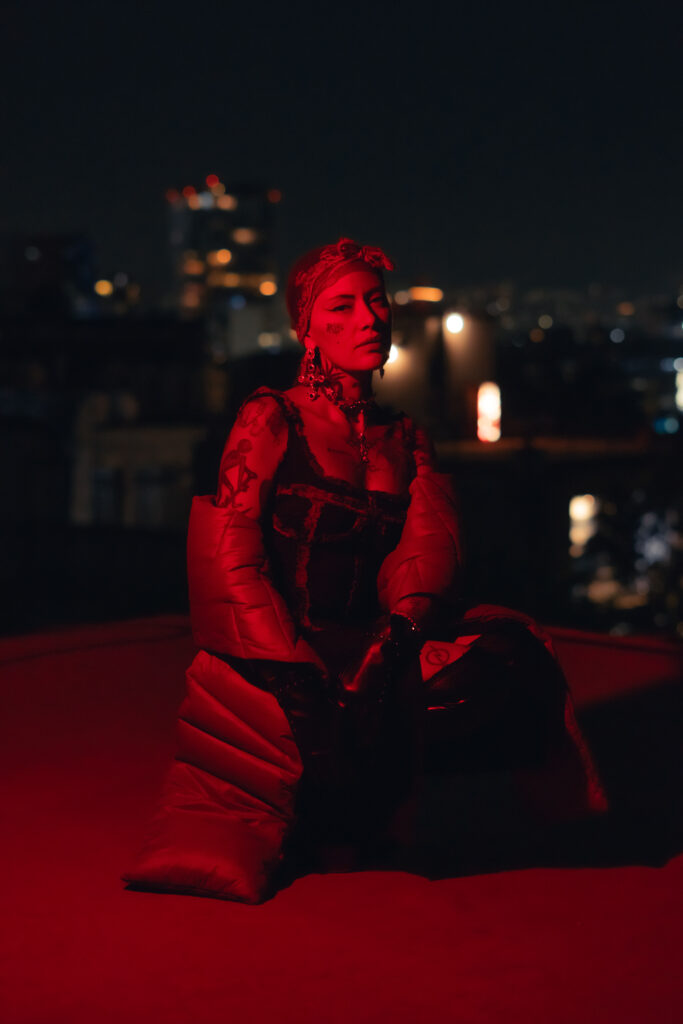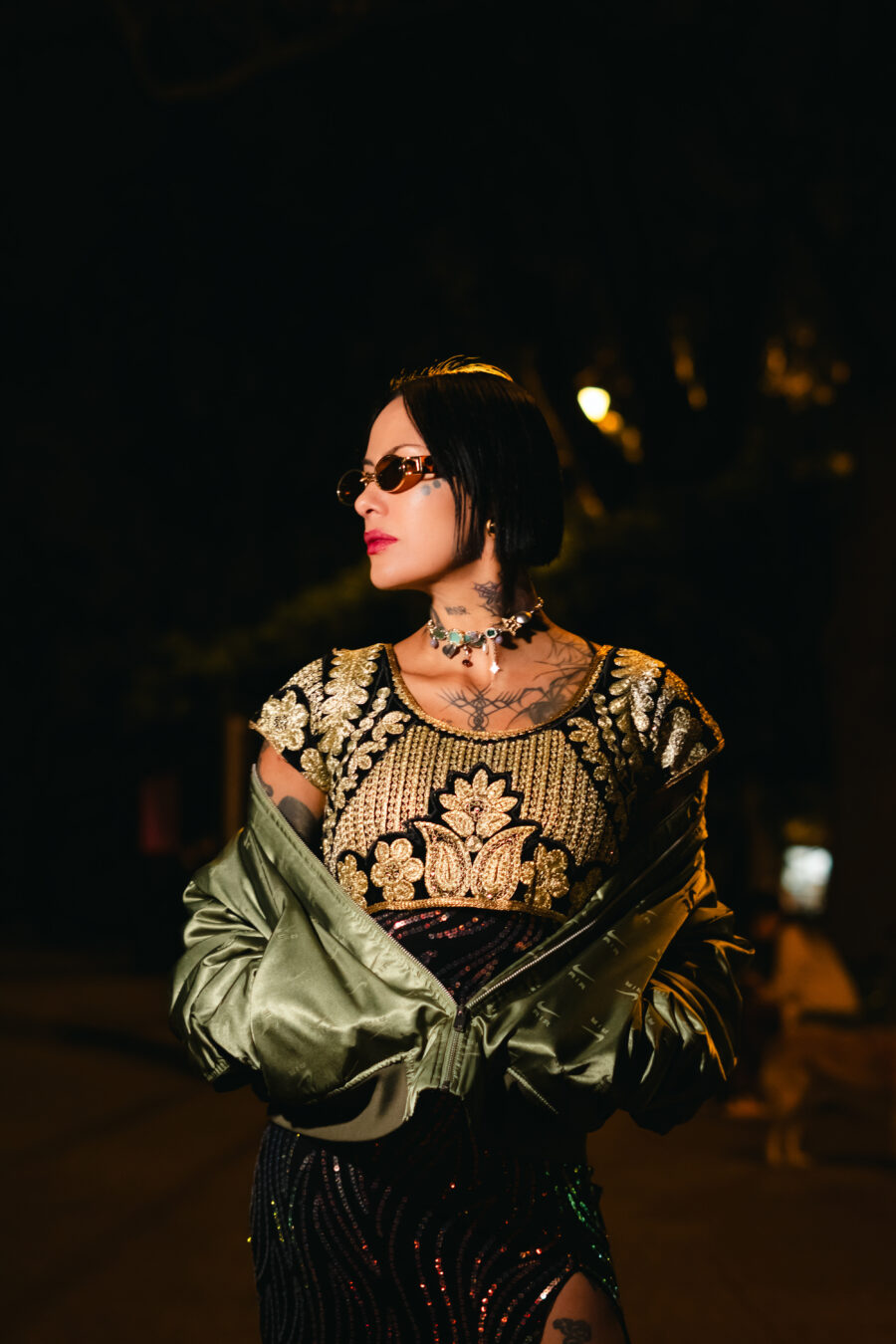I’ve lost count of how many times I’ve listened to Rosa Pistola’s Primavera Sound Boiler Room set from 2022. A flawless set that weaves together all of Rosa Pistola’s influences, the energy is infectious and is a shining moment for the Mexico-based artist who is one of the leading figures in the country’s reggaetón with this set a perfect example of one of the many reasons why she’s reached this status.
Her DJ sets just scratch the surface of the world that Rosa Pistola exists in and has built for herself. With her first experience of reggaetón at the age of 12, Rosa Pistola was drawn to music and the way it made her move. She started doing music when she was 14, forming various different bands with friends but it was when she moved to Mexico at the age of 18 that she became fully immersed in the reggaetón scene as the country offered her something different to the more pop-leaning style that was coming through in Colombia.
Learning everything from her mentors DJ Sueño and Krizis, Rosa Pistola has gone on to create a universe that allows her to bring through new, younger artists who are looking for experience and education. Through her label La Chekera Records, that she runs with DJ Sueño, she has created a safe space for artists to experiment with their music – not necessarily there to show ‘the best’ releases but give an opportunity to people to play without the pressure of creating something that’s ‘structured’ in a traditional release format. A place where Rosa Pistola can make other artist’s dreams come true. This passion for music seeps through everything she does with a mission to document and archive the culture she works within.
With a busy release schedule coming up and a European tour underway which includes key dates at Glastonbury, WHOLE Festival, Draaimolen and a residency at Colour Factory, we chat with Rosa Pistola about her journey with music, her thoughts on the rise of reggaetón, the making of her documentary with Resident Advisor, approach to her record label and much more.
Hey Laura, how are you doing? What have you been up to lately?
Hey!! I’ve been good thanks.
You first experienced reggaetón when you were 12 years old at a disco for children – do you remember how it felt hearing that music for the first time?
At the time of the minitekas, I didn’t understand the music well, I was very young. I only knew that I liked to dance and do choreographies with my cousins. The first time I went to an adult discotheque, I do remember that Tego Calderon’s songs were the first that I liked. It was a very exciting night for me and I felt like such a rebel.
How did your environment growing up shape your relationship with music?
I think that when you grow up in Colombia you are kind of obligated to dance and love music. It’s a very important part of our life, we celebrate everything with loud music and people are very open to all the different styles. This has made me have lots of respect for all kinds of music and I really think each one has something I can enjoy.
You moved to Mexico at the age of 18, did you already have a connection with the music scene, specifically the Mexican reggaetón scene, before you moved? Why did you choose Mexico?
Yes I started doing music when I was 14. I joined the percussion group of my school and on my 15th birthday my special gift was a “llamador” (very tall drum). Then I was in some punk and noise groups with my friends, in Mexico I had a witch house and experimental music label and we released CDs and cassettes that we used to make ourselves.
I chose Mexico because of a dream I had. It was a dream that I constantly had when I was young, so when the moment of making a decision came I knew it was Mexico.
In the Resident Advisor documentary you mentioned that if you stayed in Colombia you probably wouldn’t be a Reggaetonera – why is that? What is it that draws you to the Mexican style?
In Colombia reggaeton was very pop, so it didn’t represent me. When I came to Mexico I learned about a totally different style of reggaeton, and it really caught my attention. It was made with different sounds, the lyrics were more aggressive and naughty.
When you moved to Mexico, who were some of your key influences and mentors that you integrate and build the scene that you are a part of now and very much leading the way for globally?
DJ Sueño and Krizis were the people that taught me everything about working as a reggaetonera in Mexico. They supported and stood by my side all the way. Together we were called “Perreo Pesado” . We did parties and a lot of music together.
How did that documentary with Resident Advisor come about? What inspired you to make it and why did you feel that it was the right time to make a documentary spotlighting the Mexican reggaetón and cumbiatón history and artists?
I knew Mexican reggaeton was about to explode or go big, so I proposed this theme. I knew it had something special and right now they are starting to go global, I think it was the perfect time.
There’s a moment in the documentary where there’s a discussion around the fairly recent popularity of perreo and how Reggaetoneros are no longer closeted – what do you think has influenced this shift in narrative around the culture and how has it impacted the scene?
Artists like J Balvin and BadBunny who are making more pop and friendly reggaeton is the thing that has helped the genre grow and go global. Reggaeton is the new latin pop, and it’s everywhere. For me this is good and bad, good because we get to work and live from music money, but bad because it loses its personality and character and we have a million new reggaeton artists that don’t belong to the reggaeton scene, but since it is hot everyone has to do it.
You’ve been working closely with a lot of artists within the scene to help them put together their releases and get heard beyond the local communities including via your own label and party La Chekera Records, stepping into more of a mentor role – why is it important for you to be doing this work?
I know La Chekera doesn’t have the best music releases and i know my artists have a lot to learn, but I am not trying to change the world with a song. What I am trying to do is to make La Chekera a safe space to make mistakes in music industry. What we do is to support super young producers and sometimes singers, in whatever they need to stay focused or out of the bad stuff in the streets. We believe in our artists, sometimes young people just need a little hope in them and their ideas.
You mentioned in a previous interview that La Chekera Records is a safe space for people to experiment with their music, make mistakes and learn from them which is something I don’t hear a lot of label’s talking about. You’re creating this home for your artists to play, not necessarily with a set outcome in mind which I think is so important for creativity. How have you seen this impact the artist’s you work with?
I can notice this in how they start changing on a personal level, in how they start to understand the importance of teamwork and they start respecting music (I talk all the time about music values). So as I already said I don’t care about making super awesome songs, this other producers can do. I am more into sharing and caring about my community and young people. It’s about passing what we know and what we have, it’s about giving an opportunity , it’s about dreaming and learning to work so that dreams come true. But I must say this year we do have some really strong releases and I actually feel very proud.

Which artists would you like to spotlight now that more people should be paying attention to?
DJ Sueño from Mexico City and Freebot from Monterrey
Beyond the DJ sets, productions, label, documentaries and parties, you’ve also designed a clothing collection and have plans to further archive the culture of Mexican reggaeton via a book and exhibition – what draws you to the archival side of art? What does this mean to you to be able to archive the culture and its rich history?
I feel so thankful that I can enjoy music in all its forms, I am still alive because of this. I have so much respect for culture and music, it makes me feel so inspired and making these tributes and recognitions are a way of saying thanks. Sometimes I wish I could take my heart and put it in someone else so that they can also feel how I feel. Art is the best way of sharing these feelings and moments. Also I’ve always thought that we have to honour what we do by learning all we can about it, so writing history will always nurture the future.
Going into your productions, I hear you have a busy schedule coming up with new music, mostly being released after summer, but is there anything you can talk about now that you’d like to share?
I have a special album coming, it’s called Mi Cordillera, this album is special because it has been a long time since i developed a project about my feelings, Mi cordillera has a sad happy feeling, you can sense the longing, the melancholy hidden in happy melodies, you can also perceive the sound of a specific place, of a specific group of people… my people, my South American people that live and come from la cordillera de Los Andes.
What is your approach to your productions? Do you usually go into the studio with an idea in mind and do you need to be in a specific environment to be able to write music?
Every time is different. I do music for a lot of reasons, sometimes it’s just business, sometimes I am supporting a project so I have to be more executive about it, or sometimes I need to express myself, but you have to be able to do the work no matter where you are and what you have.
What is the story you’re trying to tell through your art? What does having a creative output mean to you?
I guess it is very simple. I am only trying to share a happy experience through music.
When do you feel the most creative?
When I am sad.
What’s something that you’ve discovered recently and are excited about?
Freebot, he is a young producer from Monterrey and he is giving a new shape and sound to the Mexican tribal.
You can catch Rosa Pistola touring around Europe this summer including dates at Glastonbury, WHOLE Festival and Draaimolen Festival – keep up-to-date via socials.
